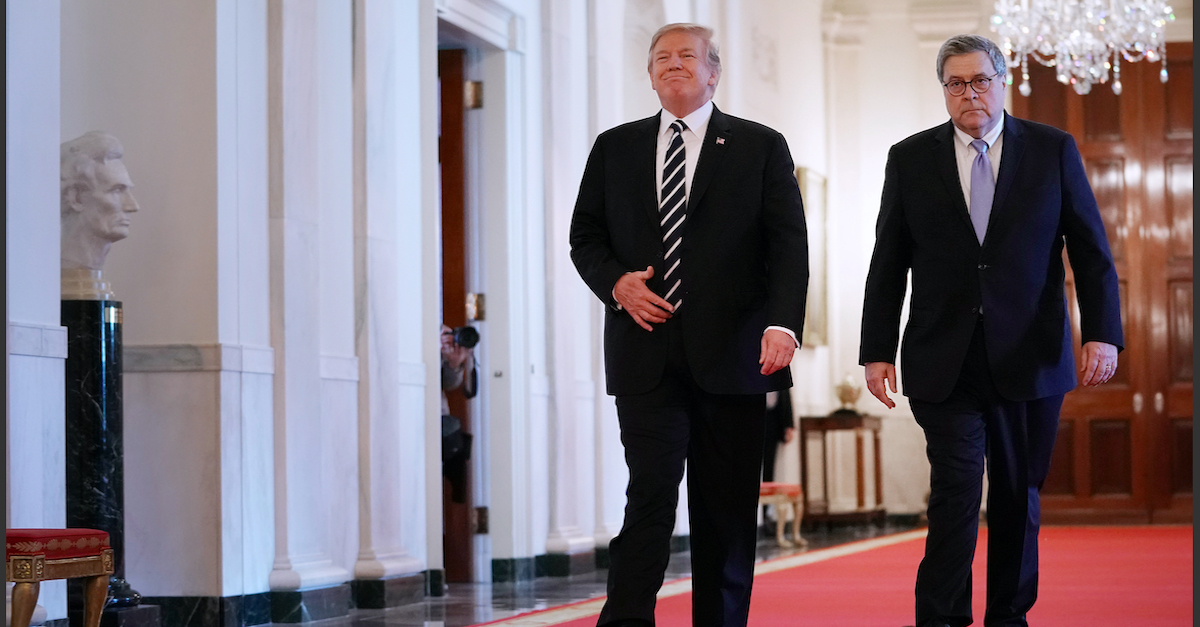
Attorneys for the White House and the Department of Justice (DOJ) scrambled to piece together a legal justification after President Donald Trump withheld military aid to the Ukraine earlier this year.
According to the New York Times, those efforts were focused on sidestepping the Impoundment Control Act of 1974–a law which requires the executive branch to notify Congress if and when already-appropriated funds are being withheld. And, in service of that goal, various attorneys developed a somewhat novel legal theory.
Per the Times:
By late summer, top lawyers at the Office of Management and Budget [(OMB)] who had spoken to lawyers at the White House and the Justice Department in the weeks beforehand, were developing an argument — not previously divulged publicly — that Mr. Trump’s role as commander in chief would simply allow him to override Congress on the issue.
The argument reportedly played out something like this: the president needed to maintain his “negotiating position” in order to aid “his efforts to fight corruption” in the former Soviet satellite. In order to keep that strong hand, the lawyers reasoned after the fact, Congress just could not know about the so-called “brief pause” in funds earmarked for the Ukrainian armed forces to obtain materiel.
This argument, however, is wholly divorced from the law on point.
The House Committee on the Budget explains:
Put simply, if the President wants to spend less money than Congress provided for a particular purpose, he or she must first secure a law providing Congressional approval to rescind the funding in question. The [Impoundment Control Act] requires that the President send a special message to Congress identifying the amount of the proposed rescission; the reasons for it; and the budgetary, economic, and programmatic effects of the rescission. Upon transmission of such special message, the President may withhold certain funding in the affected accounts for up to 45 legislative session days. If a law approving the rescission is not enacted within the 45 days, any withheld funds must be made available for obligation.
Absent a message to Congress, such a rescission–even if self-styled as a “brief pause” per the OMB–is unlawful. But the White House and various legal apparatchiks had another idea about the law itself.
According to those attorneys, the president is allowed to ignore the Impoundment Control Act because he’s the commander in chief. And the commander in chief has wide control and latitude over the nation’s overall diplomatic effort. This allows the executive branch, the lawyers reasoned, to outright flout decades of precedent and federal statutes because the president might have the genuine belief that releasing such funds would interfere with his constitutional authority. This is arguably an extension of the already extant theory of the unitary executive.
The controversial theory–advanced by legal advocates from various administrations both Democrat and Republican–holds that the U.S. president possesses absolute power and control over the entire executive branch. Proponents often cite Article II of the U.S. Constitution as the textual basis supporting the concept. Critics of the theory hold that it supplants the constitutional and democratic role played by the U.S. Congress.
Legal experts noted the departure from established norms–and return to prior history–implicated by the administration’s efforts to work an end run around the congressional power of the purse.
“There are plenty of principled disagreements over how the Constitution allocates power between the political branches,” noted University of Texas Law Professor Steve Vladeck, “But the power to control appropriations (the ‘power of the purse’) just isn’t one of them—and never has been. Not even the Bush Administration tried this one…”
Georgetown Law Professor Marty Lederman later clarified:
Actually, POTUS claims of power to “impound” funds were prominent and controversial from [Harry] Truman through [Richard] Nixon (check our the LBJ “cows” example!), until William Rehnquist, as head of OLC, and then Congress, put a stop to it.
Lederman cited the following example from a law review article:
Early in his Administration, Truman responded to one such legislative attempt in a dramatically new way. In 1949, the President requested funding for forty-eight Air Force groups. The House, however, insisted on the creation of fifty-eight groups. Truman signed the bill, but, invoking his powers as Commander in Chief, he directed the Secretary of Defense to impound the extra $735 million, arguing that the ten extra groups would only make the Air Force less flexible. Following Truman’s lead, the executive branch continued to raise constitutional doubts, of varying degrees, about mandatory defense spending provisions until at least the mid-1970s, although it is not clear that the Commander in Chief Clause was ever again impressed as a necessary justification for an actual refusal to comply with an expenditure mandate…
Trump’s post facto legal defense for withholding Ukrainian military aid does appear to have some historical parallels, but as Lederman noted, those earlier invocations of such broad executive authority were long ago reined in by the White House and then Congress itself via the Impoundment Control Act.
The 45th president is effectively carving out legal theories from an already-dispensed with and foreclosed against past.
Those efforts were apparently predictable and predicted.
Law&Crime asked national security attorney Bradley P. Moss for his thoughts on the administration’s argument against the congressional purse power. In an email, he directed us back to the pinned tweet on his Twitter timeline:
The legal precedents that will emerge from the Trump era regarding the power of the Executive Branch to insulate itself from Congressional oversight will be more significant than anything we have seen since Nixon.
— Bradley P. Moss (@BradMossEsq) May 6, 2019
[image via Chip Somodevilla/Getty Images]